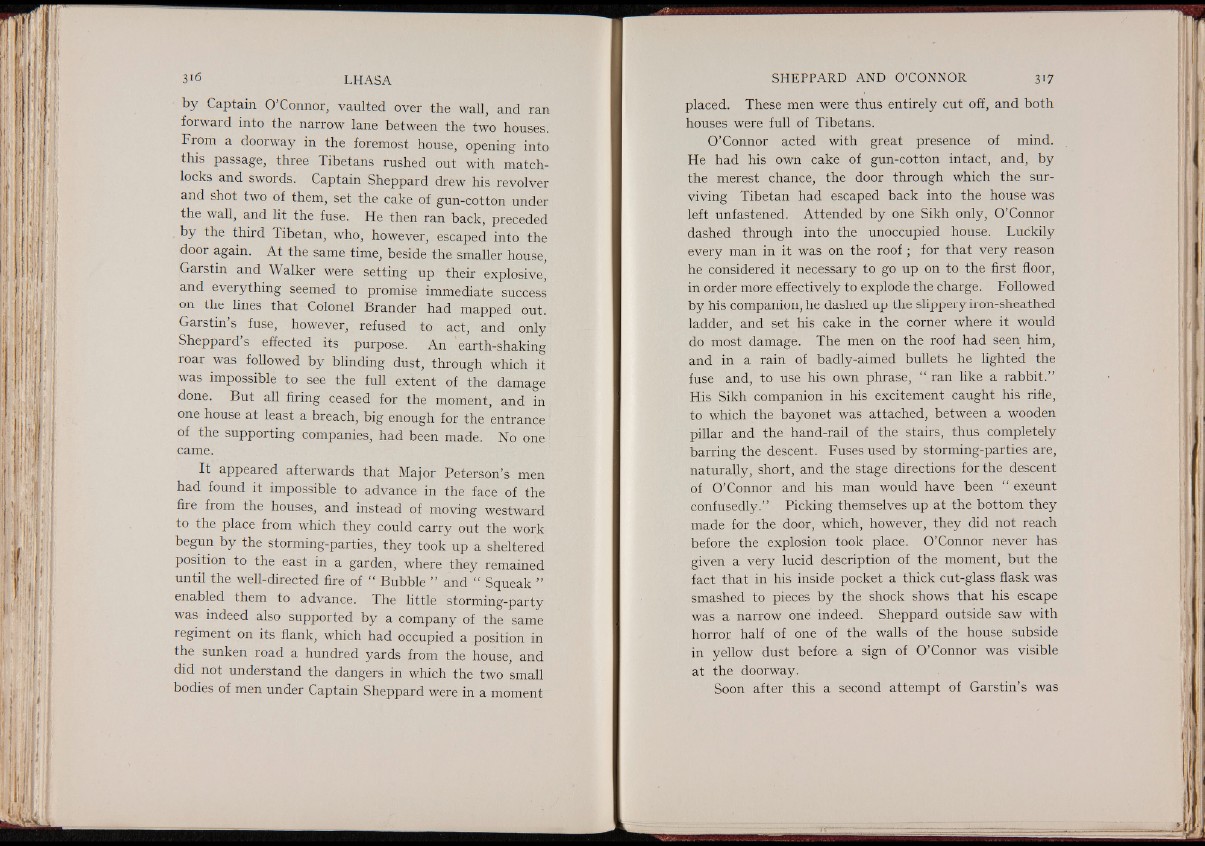
by Captain O’Connor, vaulted over the wall, and ran
forward into the narrow lane between the two houses.
From a doorway in the foremost house, opening into
this passage, three Tibetans rushed out with matchlocks
and swords. Captain Sheppard drew his revolver
and shot two of them, set the cake of gun-cotton under
the wall, and lit the fuse. He then ran back, preceded
, by the third Tibetan, who, however, escaped into the
door again. At the same time, beside the smaller house,
Garstin and Walker were setting up their explosive,
and everything seemed to promise immediate success
on the lines that Colonel Brander had mapped out.
Garstm’s fuse, however, refused to act, and only
Sheppard’s effected its purpose. An earth-shaking
roar was followed by blinding dust, through which it
was impossible to see the full extent of the damage
done. But all firing ceased for the moment, and in
one house at least a breach, big enough for the entrance
of the supporting companies, had been made. No one 1
came.
It appeared afterwards that Major Peterson’s men
had found it impossible to advance in the face of the
fire from the houses, and instead of moving westward
to the place from which they could carry out the work
begun by the storming-parties, they took up a sheltered
position to the east in a garden, where they remained
until the well-directed fire of “ Bubble ” and “ Squeak ”
enabled them to advance. The little storming-party
was indeed also supported by a company of the same
regiment on its flank, which had occupied a position in
the sunken road a hundred yards from the house, and
did not understand the dangers in which the two small
bodies of men under Captain Sheppard were in a moment
placed. These men were thus entirely cut off, and both
houses were full of Tibetans.
O’Connor acted with great presence of mind.
He had his own cake of gun-cotton intact, and, by
the merest chance, the door through which the surviving
Tibetan had escaped back into the house was
left unfastened. Attended by one Sikh only, O’Connor
dashed through into the unoccupied house. Luckily
every man in it was on the roof; for that very reason
he considered it necessary to go up on to the first floor,
in order more effectively to explode the charge. Followed
by his companion, he dashed up the slippery iron-sheathed
ladder, and set his cake in the corner where it would
do most damage. The men on the roof had seen him,
and in a rain of badly-aimed bullets he lighted the
fuse and, to use his own phrase, “ ran like a rabbit.”
His Sikh companion in his excitement caught his rifle,
to which the bayonet was attached, between a wooden
pillar and the hand-rail of the stairs, thus completely
barring the descent. Fuses used by storming-parties are,
naturally, short, and the stage directions for the descent
of O’Connor and his man would have been “ exeunt
confusedly.” Picking themselves up at the bottom they
made for the door, which, however, they did not reach
before the explosion took place. O’Connor never has
given a very lucid description of the moment, but the
fact that in his inside pocket a thick cut-glass flask was
smashed to pieces by the shock shows that his escape
was a narrow one indeed. Sheppard outside saw with
horror half of one of the walls of the house subside
in yellow dust before, a sign of O’Connor was visible
at the doorway.
Soon after this a second attempt of Garstin’s was